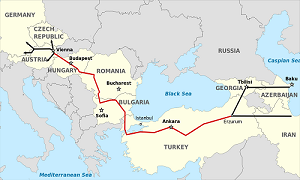Russian Gas in the Southern Gas Corridor Could Undermine the EU’s Diversification Plans
By Ilgar Gurbanov
March 27, 2017, the CACI Analyst
Gazprom has officially declared its willingness to use the Trans-Adriatic Pipeline (TAP) as a route to deliver gas to Europe. TAP is an integral part of the Southern Gas Corridor (SGC) which is one of the priority energy projects for the EU to ensure the continent’s security of supply from a non-Russian source. Although technical and legal possibilities exist for Gazprom’s use of TAP’s expanded capacity, the long-term contracts securing the pipeline’s initial capacity for Azerbaijani gas together with EU legislation makes this option less likely. Nevertheless, the possibility of a Russian bid for TAP could hamper the EU’s diversification plans and block future gas supplies from other non-Shah-Deniz sources.

Real friends? Georgia-Turkey relations in the wake of the July 15 coup attempt
By Boris Ajeganov
August 10th, 2016, The CACI Analyst
Georgian PM Giorgi Kvirikashvili became the first foreign head of state to visit Turkey after the failed coup attempt by parts of the Turkish military in the evening of Friday, July 15. Kvirikashvili met with his counterpart, PM Binali Yildirim, and President Erdoğan in Ankara on July 19 as part of an inaugural meeting of the High Level Georgia-Turkey Strategic Cooperation Council. The visit — the PM’s first official to Turkey — was planned long before the attempted coup. Although the event focused on bilateral trade and economic issues, both parties emphasized that the official visit demonstrated Georgia’s continued support for Turkey’s democratically elected authorities, despite concerns that Erdoğan used the coup attempt as pretext for a major purge of political opponents at all levels of government. In the end of the day, regardless of what direction Turkey’s politics take, Georgia does not have much of a choice but to toe its neighbor’s line, come rain or shine.
The "Four-Day War": new momentum for Nagorno-Karabakh resolution?
By Zaur Shiriyev
May 2nd, 2016, The CACI Analyst
In early April, the escalation of hostilities between Armenia and Azerbaijan resulted in a so-called “four-day war”, which was ended by a truce reached under Russia’s auspices. The expectation was that after the end of this short war, international engagement would increase, with the re-energizing of the Minsk Group. But so far, Moscow is the only active party. The Russian Foreign Minister, Sergey Lavrov, is conducting “shuttle diplomacy” between Yerevan and Baku, the results of which will become clear in the coming weeks.





